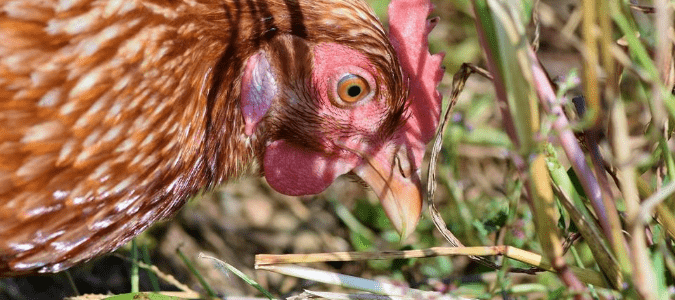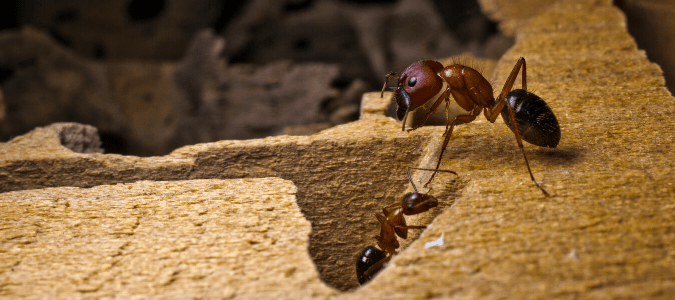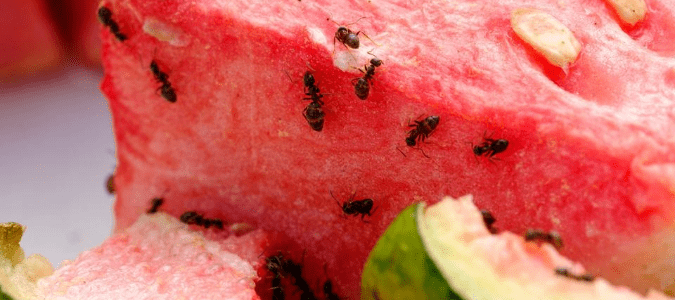Do Chickens Eat Ants?

Furthermore, the type of ants you have in your yard matters. For example, chickens can be harmed by fire ants just the same way that humans can if these ants swarm over them and bite them. Unfortunately, chickens have also been known to get sick when they consume toxic products that were put out as pest killers to keep insect populations at bay. Certain ant killer products claim to be safe for chickens and animals, but they must be used exactly according to the specific directions on the package in order for animals to stay safe when exposed to them.
Ants and other insects have also been known to pass parasites to chickens when these domesticated animals ingest them; chickens can also contract parasites simply from pecking in the dirt when foraging for insect treats. Chickens and their coops can also have problems with mite, tick, flea and other parasitic insect infestations. If you notice your chickens seeming restless, laying fewer eggs or resisting going into their coops at night, it’s possible that they are being bothered by these pests. And, unfortunately, if you have found one flea, it could mean an infestation that impacts all your backyard feathered friends.
There are also other pest-related downsides to raising chickens, including the fact that having chickens in your yard can actually draw various types of pests including ants, as well as rats, raccoons, snakes and flies. For example, some people like to feed their chicken fresh veggies, and ants are quickly drawn to this fresh food, as well as to broken chicken eggs. That’s why if you’re raising chickens and an egg breaks, it’s important to clean it up as quickly as possible so it won’t draw ants or other unwanted pests.
Rats and snakes are also attracted to chicken feed and chicken eggs for a tasty meal (and even sometimes to chicks or chickens themselves), while flies are attracted to chicken excrement for laying their own eggs. Flies especially can become a problem in a yard with chickens if you aren’t careful about keeping the coop clean and dry.
There are certain methods of pest control that can be effective around chickens, including sprinkling food-grade diatomaceous earth around the coop and pouring boiling water over fire ant piles to kill them. If you use the latter method, of course, take extra caution to protect chickens and other animals from potential burns, and be aware that boiling water may kill any plants it comes into contact with along with the ants. It also may not work on the ants, if the colony’s queen is too far below the ground’s surface to be reached by the boiling water.
Many people, including those who raise chickens in their yards, find it easiest and most effective in terms of both time and effort to hire a licensed pest control professional to handle pest control problems in their yards, including ant infestations. Pest management specialists can work with you to determine which types of pests are a problem in your home or your outdoor space, and will devise a pest control plan that is low impact for young family members, along with your pets and any other animals you may keep.
However, if you are wondering whether or not it is okay to let your chickens roam and eat any ants in your backyard, you’ll need to identify which type of ant is on your property. This will tell you if the problem is fire ants or something else. Keep reading to learn how to identify ants and their mounds, as well as what likely attracted ants to your property in the first place.

Common Species and Types of Ant Mounds
Knowing which type of ants you have in your yard is an important step in determining the best way to get rid of these unwanted visitors. There are several different types of ant mounds that people commonly find in their backyards, including backyards with chicken coops. Observing the types of ant mounds, or ant hills, that you have in your yard can give you clues about what type of ant you’re dealing with, so you are armed with the most accurate information to decide what to do next.
Fire Ants
Fire ant mounds are common in backyards across the country, and most people consider these creatures a true pest since the aftermath of close encounters is often so painful. These types of ants may be present without a mound, since these insects can forage through cracked earth in dry conditions. What many of us call a fire ant bite is technically not a bite but a sting, and true to the ant’s name, it can feel like you’ve been burned. Worse still, fire ants tend to swarm when disturbed, so it’s common not to get just a single fire ant bite, but several—since by the time you realize there’s an ant on your skin, there are already quite a few on the attack.
Sometimes children like to disturb fire ant mounds on purpose because of the spectacle of the ants swarming out of the mound almost instantly, as soon as the mound is kicked or poked with a stick. But this swarming behavior is exactly what makes fire ants so dangerous, especially for children who don’t understand the danger—within seconds, fire ants could be swarming over the child’s feet and legs, painfully biting (or stinging) wherever they can. Fire ant bites can turn into blisters and can even develop secondary infections; they can also be more serious in very small children or in people who are immuno-compromised. At the very least, they are incredibly itchy and annoying, and someone no one wants to experience again.
Fire ants are small and a dark, coppery reddish-brown color. Their mounds look like piles of loose, fluffy dirt, with no visible ant activity until the mound is disturbed. Fire ants often build their mounds after a rainstorm, and often out in an open area of grass, alongside a sidewalk or against the foundation of a house or garage. They build their mounds quickly, within hours, and can build them to heights of a foot or more if given the chance. If you have chickens, be aware that fire ants might build a mound next to or against the chicken coop. This can spell trouble, since small or sick chickens can be overwhelmed by fire ant bites. If fire ants invade your chicken coop, the ants will need to be eliminated as quickly as possible for the chickens’ safety.
Carpenter Ants
Carpenter ants are another ant commonly found in and around people’s homes, and these ants actually provide a good snack for a chicken. Carpenter ants are much larger than fire ants, and are typically dark brown or black in color, as you can see in the image above. They are far less aggressive than fire ants, and they don’t bite nearly as much. Carpenter ants also don’t build mounds in soil the way fire ants do. Instead, they build their nests in wood. Since they excavate wood, they can cause damage to homes, garages and other wooden structures, and should be eliminated promptly when found on your property.
Sugar Ants
Sugar ants is a broad term that can be used to describe a wide variety of small ants found in or around homes. These species are smaller than fire ants and can range from orange to black in color. Some types create mounds which look like small volcanoes made of dirt—a raised ring of loose dirt that is a couple of inches in diameter, with a hole in the middle. True to their name, sugar ants are attracted to sugar, and they can quickly become a real headache in people’s kitchens. Fortunately, they don’t bite and aren’t overtly harmful to people (or to chickens).
If you aren’t sure which type of ant mound you have in your yard, or you don’t know the best way to get rid of these pests, it’s a good idea to contact a reputable pest control specialist who can identify the exact type of ant and determine the safest and most effective methods for eliminating them.
Whether you contact a specialist or attempt do-it-yourself pest control, it’s important to learn what attracted the ants to your property in the first place so you can prevent a future problem.

What Attracts Ants Into the House?
If you have an ant problem in your yard, it’s not unlikely that you might also have an ant problem in your home. Various types of ants commonly invade indoor spaces in search of food, water or shelter. In fact, if you’re wondering what attracts ants into the house, consider those three basic needs and how the ants might be accessing them inside your home.
In the kitchen, for example, it’s important to keep food, especially sweet foods, inside air-tight containers, and keep the stovetop and counters clean, since sugar ants, as well as carpenter ants, are attracted to sugary treats that they might find in a less sanitary kitchen.
As with any pest problem, preventing an infestation is often easier than resolving one. To prevent an ant infestation, you’ll need to make your house as ant-proof as possible. Start with basic steps like cleaning the kitchen every day, including counters and floors. Make sure the garbage can has a well-fitting lid and take out the trash on a regular basis.
Next, look to your windows and exterior doors. Repair any gaps or tears in the screens or around the window and door frames, because all types of pests, including ants, commonly use these as entry points into people’s homes. Repair any leaky faucets or pipes, since these can draw ants, as these insects need moisture to survive. Potted plants are another popular indoor spot for hidden ant infestations; check your indoor plants to make sure ants aren’t building nests in the soil.
If you have an ant infestation that proves beyond your ability to handle, contact a licensed pest control specialist to resolve the issue. Often, resolving an ant problem requires a level of experience and knowledge of ant behavior and biology that only a pest control professional can have. Hiring a pest management specialist is often the quickest and most effective way to eliminate ants and any other type of pests that might invade your home or yard.
Chem-Free Can Treat the Ants on Your Property
Trying to control an ant problem while also taking into account your kids and pets can prove difficult. When you contact Chem-free Organic Pest Control, you can have peace of mind that we will create a custom pest control solution that keeps all of your family members in mind. Once we have treated the ants on your property, we will leave you with green tips on how to prevent future encounters with these pests.
Need Help Managing Pests?
Chem-Free offers both effective, low-impact pest control options and preventative measures to help avoid future infestations. Contact us today for a free estimate!


